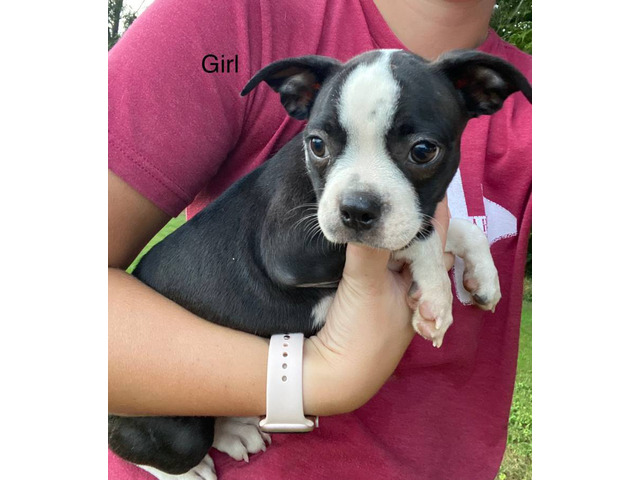Boston Terrier dog breed information
Overview
Originating in the United States in the late 19th century, the Boston Terrier was developed from English Bulldog and white English Terrier types. Bred primarily as a companion and small working dog, the Boston Terrier is known for its compact, muscular build and tuxedo-like markings. Nicknamed the "American Gentleman," the breed is affectionate, intelligent, and people-oriented.
Appearance & Size
- Size: Small, compact, muscular.
- Weight: Typically 12–25 lb (5–11 kg), depending on lines.
- Height: Commonly up to about 15–17 inches (38–43 cm) at the shoulder for show lines.
- Coat: Short, smooth, fine. Common color/patterns: black (or brindle), seal, or blue with white markings ("tuxedo").
- Distinctive features: Square head, short muzzle (brachycephalic), large expressive eyes, erect ears.
Temperament & Behavior
Boston Terriers are friendly, affectionate, and lively. They are highly people-focused and typically do well with families and children when socialized properly. They enjoy play and short bursts of activity but are not typically hyperactive. Positive reinforcement training works best; they can be sensitive to harsh corrections.
Exercise & Mental Stimulation
Exercise needs: Moderate. Daily walks (20–40 minutes) plus play sessions are usually sufficient. Puppies and adolescents may need slightly more activity.
Mental enrichment: Provide puzzle toys, short training sessions, and interactive play to prevent boredom. Boston Terriers enjoy learning tricks and household games.
Apartment suitability: Excellent, provided they get daily exercise and mental stimulation.
Grooming & Basic Care
- Weekly brushing with a soft bristle brush removes loose hair and keeps the coat shiny.
- Wipe facial folds and nose wrinkles regularly to prevent moisture buildup and irritation.
- Routine dental care — brush teeth several times per week or provide dental chews.
- Trim nails every 3–6 weeks (depending on activity level).
- Check ears weekly for debris or infection; clean as needed.
- Bathe only as needed — frequent bathing can dry skin. Use a gentle dog shampoo.
Health Considerations & Common Issues
Boston Terriers have a few breed-specific health concerns to be aware of:
- Brachycephalic (short-nosed) issues: snorting, exercise intolerance, heat sensitivity, and in some dogs, brachycephalic airway syndrome. Avoid heavy exercise in hot/humid weather and monitor breathing.
- Eyes: Prominent eyes make the breed susceptible to corneal ulcers, abrasions, dry eye, and other ocular problems. Prompt veterinary attention is necessary for eye injuries.
- Heart: Some Boston Terriers have congenital murmurs or other cardiac issues — routine cardiac checks recommended.
- Orthopedic: Patellar luxation and other joint issues can occur.
- Deafness: Possible (especially in dogs with extensive white markings), though not as common as in some other breeds.
- Typical lifespan: Around 11–15 years with proper care.
Recommended health screenings (for breeders/puppy buyers): ophthalmologist exam, cardiac auscultation (and echocardiogram if indicated), patellar evaluation, and relevant genetic testing available for the breeder's lines. Ask breeders to provide health clearances for both parents.
Feeding & Weight Management
Feed a high-quality, age-appropriate diet and follow feeding guidelines based on body condition rather than strictly by weight or package directions. Boston Terriers can gain weight easily — excess weight worsens breathing and joint problems, so monitor body condition and adjust portions, treats, and activity as needed. Fresh water should always be available.
Finding a Puppy or Adult Boston Terrier
Options include reputable breeders and rescues/adoption organizations. Both can be good choices depending on your preferences and patience required.
Questions to Ask a Breeder
- Can you provide health clearances for both parents (ophthalmologist, cardiac, patella, genetic tests)?
- May I see the puppy’s parents and how they live?
- What socialization has the puppy received?
- Do you provide a written health guarantee and a return policy?
- Who is your veterinarian of record?
Rescue & Adoption
Boston Terrier rescue organizations often rehome adults and seniors. Adoption lets you save a life and often provides a better idea of the dog's adult temperament. If you want, search for “Boston Terrier rescue” plus your city/state to find local groups.
Costs to Expect
- Upfront: Puppy price varies by breeder, bloodline, and location — typically from several hundred to a few thousand USD.
- Ongoing: Food, routine vet care, vaccinations, dental care, grooming supplies, training classes, and pet insurance (recommended due to breed predispositions).
- Emergency: Budget for unexpected vet visits, especially for eye or airway issues which may require urgent care.
When to See a Vet — Urgent Signs
Seek immediate veterinary care for:
- Severe breathing difficulty, blue/pale gums, or collapse
- Sudden eye trauma, bleeding, or rapidly worsening cloudiness
- Persistent vomiting or diarrhea, especially with weakness
- Signs of severe pain or inability to move
Pros & Cons of Owning a Boston Terrier
| Pros | Cons |
|---|---|
| Affectionate, compact (apartment-friendly), low grooming, great companion | Brachycephalic health issues, heat sensitivity, risk of eye problems |
Frequently Asked Questions
Are Boston Terriers good with children?
Generally yes — they are affectionate and playful. Supervision and teaching respectful handling are essential, especially with young children.
Do Boston Terriers bark a lot?
They are alert and may bark to alert you, but they’re not known as excessive barkers when trained properly.
How hot is too hot for a Boston Terrier?
Because of their short noses, they tolerate heat poorly. Avoid strenuous activity in hot/humid weather, provide shade, and keep walks to cooler times of day. Never leave a brachycephalic dog unattended in a hot car.
Resources & Further Reading
- AKC — Boston Terrier Breed Profile
- Consult your veterinarian and a veterinary ophthalmologist for breed-specific medical guidance.
